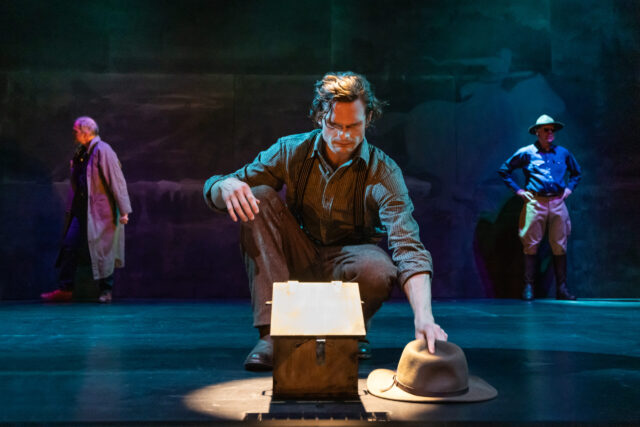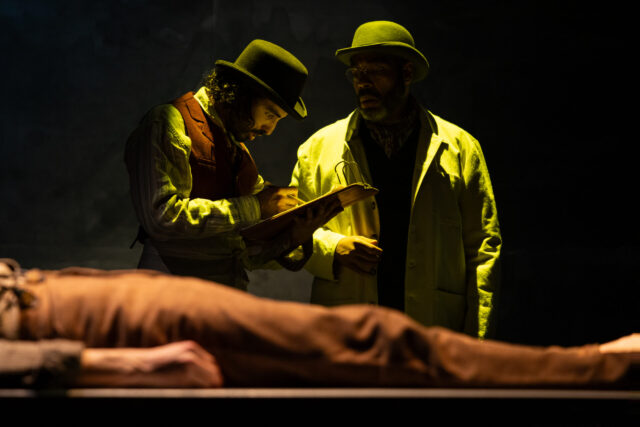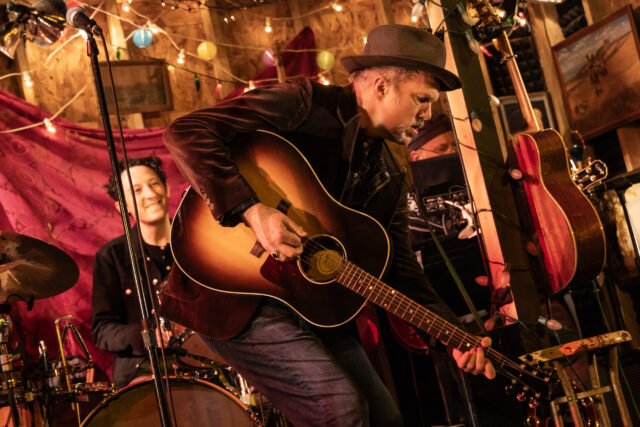
Elmer J. McCurdy (Andrew Durand) faces an unusual reckoning in Dead Outlaw (photo by Matthew Murphy)
DEAD OUTLAW
Audible Theater’s Minetta Lane Theatre
18 Minetta Lane between Sixth Ave. and MacDougal St.
Tuesday – Sunday through April 7, $87-$126
www.audible.com
In 1976, while setting up to shoot an episode of The Six Million Dollar Man, crew members discovered a body hanging in a tree. They could not rebuild him; he was not going to be another bionic man.
The true story of that mummified creature is told in Dead Outlaw, making its world premiere at Audible’s Minetta Lane Theatre through April 7. It’s from the same team that collaborated on the Tony-winning The Band’s Visit, but it’s unlikely to have the same impact and get as many visits.
Elmer McCurdy was born in 1880 in Searsmont, Maine; as dysfunctional as the first part of his life was, what happened to him afterward was an even stranger (mis)adventure.
Following a difficult childhood, Elmer (Andrew Durand) hops a train, searching for something else. He travels to Kansas, Missouri, and Oklahoma, picking up odd jobs, drinking too much, shacking up with the lovely Maggie (Julia Knitel), serving in the military, and, slowly but surely, becoming a hapless outlaw. He joins up with the Jarrett brothers, led by Walter (Jeb Brown), but he fails miserably at his responsibility, breaking into safes.
When he is eventually killed at the age of thirty-one, no one in his family claims his body. Johnson (Eddie Cooper), the local coroner, uses arsenic when embalming the corpse in order to preserve it until someone shows up to take Elmer, but soon he is charging admission for people to gawk at the body, kicking off a whole new career for the dead outlaw, culminating in a second autopsy in 1976 by Dr. Thomas Noguchi (Thom Sesma), the LA medical examiner who handled such famous deaths as Marilyn Monroe, Elvis Presley, and Natalie Wood.

Coroners have questions about a strange body in Audible world premiere (photo by Matthew Murphy)
The strange tale is narrated by the bandleader (Brown), who plays guitar and trades lead vocals with Erik Della Penna, who plays guitar, lap steel, and banjo. The rest of the excellent band consists of music conductor Rebekah Bruce on keyboards, Hank on electric guitar, Chris Smylie on bass, and Spencer Cohen on drums, performing in a honky tonk shack that rolls around the stage with the help of multiple people. Arnulfo Maldonado’s set also features painted Western murals on the back wall and stanchions to the left and right, while Sarah Laux’s period costumes are exemplary.
The music and lyrics are by multiple Tony winner David Yazbek (Tootsie, Dirty Rotten Scoundrels), who has been haunted by the life and death of McCurdy for thirty years, and Della Penna (Toby and the Big Top), with a book by Tony winner Itamar Moses (The Ally, Bach at Leipzig) and direction by Tony winner David Cromer (Our Town, Uncle Vanya).
The first part of the play is a jaunty frolic, with rocking country tunes and Brown serving as a terrific master of ceremonies. The show opens with the rollicking “Dead,” in which Brown and Della Penna proclaim, “You came with noth’n, / you’ll leave here just the same,” rattling off the names of deceased people, from John Gotti, John Dillinger, Babe Ruth, Honoré de Balzac, Bert Convy, and Anne Frank to, in a later reprise, several well-known figures who are still alive. Each chorus about the dead ends, “And so are you,” a reminder that no one is immune from eventually leaving this mortal coil.
In “Normal People,” Erik and Elmer explain, “Don’t know what I want to be / Just as long as it ain’t me, / Like normal people,” emphasizing Elmer’s relatable lack of identity. In “Nobody Knows Your Name,” Elmer opines, “It isn’t right, it isn’t fair / It’s like you’re born but you’re not anywhere / And once you’re gone / It’s just the same / When nobody knows / Nobody knows your name.”
In Elmer’s case, it’s not just the same once he’s gone, as evidenced by Johnson’s statement that “death is a business.” But from that point on, as Elmer’s death refuses to die, the musical unravels like a mummy falling apart at the seams. The music shifts genres as Elmer’s corpse makes the rounds, losing the flow of the narrative, which also gets caught up in too many details. Instead of having individual songs for so many stops on Elmer’s body’s journey, it might have been better to have condensed them into one or two numbers. “Andy Payne,” for example, about a Cherokee farmer (Trent Saunders) running a race, might be electrifying on its own but here feels like it belongs in a different show. In addition, some of the continuity is lost as the audience watches actors and stagehands move the heavy set, which happens much more in the second half of the hundred-minute work.

Jeb Brown is a standout as the master of ceremonies in Dead Outlaw (photo by Matthew Murphy)
Durand (Shucked, Head Over Heels) is much braver than Elmer, especially as he spends a substantial portion of the show standing up in a coffin. Brown (Beautiful: The Carole King Musical, Becomes a Woman) is the heart and soul of Dead Outlaw, charming and amiable as both the bandleader and Jarrett. Cooper (Parade, Assassins), Knitel (Beautiful: The Carole King Musical, Bye Bye Birdie), Ken Marks (Hindle Wakes, Airline Highway), Dashiell Eaves (Coram Boy, Fabulation, or The Re-Education of Undine), Saunders (Hadestown, Aladdin), and Sesma (Arden of Faversham, A Man of No Importance) provide solid support in multiple roles, although it can get confusing who’s who.
Elmer McCurdy had a pathetic life, mostly of his own doing, and an even more pathetic death, which he had nothing to do with. His bizarre story deserves to be more well known, especially now, in a time when people are encouraged to take control of their personal narrative and define who they are. If only Dead Outlaw hadn’t veered off course, losing focus on how it was defining itself.
[Mark Rifkin is a Brooklyn-born, Manhattan-based writer and editor; you can follow him on Substack here.]